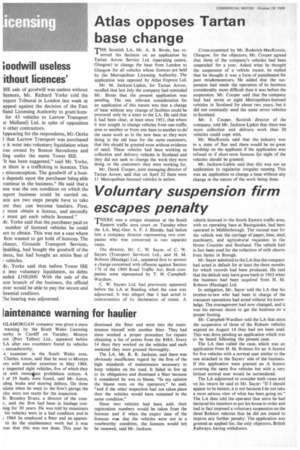Atlas opposes Tartan base change
Page 32

If you've noticed an error in this article please click here to report it so we can fix it.
THE Scottish LA, Mr. A. B. Birnie. has re served his decision on an application by Tartan Arrow Service Ltd. (operating centre, Glasgow) to change the base from London to Glasgow for all vehicles whose licences are held by the Metropolitan Licensing Authority. The application was opposed by Atlas Express Ltd.
Mr. M. Jackson-Lipkin, for Tartan Arrow, recalled that last July the company had reminded Mr. Birnie that the present application was pending. The one relevant consideration for an application of this nature was that a change of base without any change of facilities could be procured only by a letter to the LA. He said that it had been clear, at least since 1951, that where it was sought to change vehicles from one traffic area to another or from one base to another to do" the same work as in the new base as they were doing in the old base for the same customers, that this should be granted even without evidence of need. These vehicles had been working as collection and delivery vehicles in Scotland and they did not seek to change the work they were doing or the customers they were working for.
Mr. Derek Cooper, joint managing director of Tartan Arrow, said that on April 22 there were 11 Metropolitan licensed vehicles in action. Cross-examined by Mr. Roderick MacKenzie. Glasgow, for the objectors, Mr. Cooper agreed that three of the company's vehicles had been suspended for a year. Asked what he thought the suspension of a vehicle meant, he replied that he thought it was a form of punishment for past misdemeanours. He added that the suspension had made the operation of its business considerably more difficult than it was before the suspension. Mr. Cooper said that the company had had seven or eight Metropolitan-licensed vehicles in Scotland for about two years, but it did not constantly send the same seven vehicles to Scotland.
Mr. 3. Cooper, Scottish director of the company, told Mr. Jackson-Lipkin that there was more collection and delivery work than 20 vehicles could cope with.
Mr. MacKenzie said that the industry was in a state of flux and there would be no great hardship on the applicant if the application was refused or if short-term licences for eight of the vehicles should be granted.
Mr. Jackson-Lipkin said that this was not an application to regularize irregular running. This was an application to change a base without any change in the nature of the work being done.
























































































































